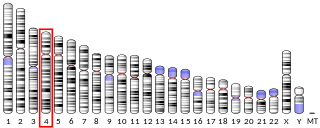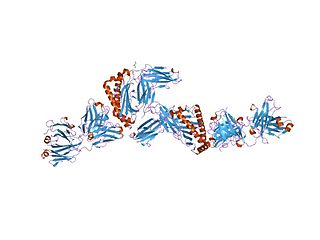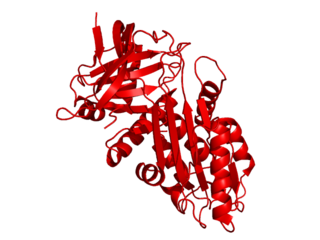| MAGED4 | |||||||||||||||||||||||||||||||||||||||||||||||||||
|---|---|---|---|---|---|---|---|---|---|---|---|---|---|---|---|---|---|---|---|---|---|---|---|---|---|---|---|---|---|---|---|---|---|---|---|---|---|---|---|---|---|---|---|---|---|---|---|---|---|---|---|
| Identifiers | |||||||||||||||||||||||||||||||||||||||||||||||||||
| Aliases | MAGED4 , MAGE-E1, MAGE1, MAGEE1, MAGE family member D4, MAGE-D4 | ||||||||||||||||||||||||||||||||||||||||||||||||||
| External IDs | OMIM: 300702 HomoloGene: 52232 GeneCards: MAGED4 | ||||||||||||||||||||||||||||||||||||||||||||||||||
| |||||||||||||||||||||||||||||||||||||||||||||||||||
| |||||||||||||||||||||||||||||||||||||||||||||||||||
| |||||||||||||||||||||||||||||||||||||||||||||||||||
| Wikidata | |||||||||||||||||||||||||||||||||||||||||||||||||||
| |||||||||||||||||||||||||||||||||||||||||||||||||||
MAGE family member D4 is a protein that in humans is encoded by the MAGED4 gene. [3]
| MAGED4 | |||||||||||||||||||||||||||||||||||||||||||||||||||
|---|---|---|---|---|---|---|---|---|---|---|---|---|---|---|---|---|---|---|---|---|---|---|---|---|---|---|---|---|---|---|---|---|---|---|---|---|---|---|---|---|---|---|---|---|---|---|---|---|---|---|---|
| Identifiers | |||||||||||||||||||||||||||||||||||||||||||||||||||
| Aliases | MAGED4 , MAGE-E1, MAGE1, MAGEE1, MAGE family member D4, MAGE-D4 | ||||||||||||||||||||||||||||||||||||||||||||||||||
| External IDs | OMIM: 300702 HomoloGene: 52232 GeneCards: MAGED4 | ||||||||||||||||||||||||||||||||||||||||||||||||||
| |||||||||||||||||||||||||||||||||||||||||||||||||||
| |||||||||||||||||||||||||||||||||||||||||||||||||||
| |||||||||||||||||||||||||||||||||||||||||||||||||||
| Wikidata | |||||||||||||||||||||||||||||||||||||||||||||||||||
| |||||||||||||||||||||||||||||||||||||||||||||||||||
MAGE family member D4 is a protein that in humans is encoded by the MAGED4 gene. [3]
Gastrointestinal cancer refers to malignant conditions of the gastrointestinal tract and accessory organs of digestion, including the esophagus, stomach, biliary system, pancreas, small intestine, large intestine, rectum and anus. The symptoms relate to the organ affected and can include obstruction, abnormal bleeding or other associated problems. The diagnosis often requires endoscopy, followed by biopsy of suspicious tissue. The treatment depends on the location of the tumor, as well as the type of cancer cell and whether it has invaded other tissues or spread elsewhere. These factors also determine the prognosis.

CD133 antigen, also known as prominin-1, is a glycoprotein that in humans is encoded by the PROM1 gene. It is a member of pentaspan transmembrane glycoproteins, which specifically localize to cellular protrusions. When embedded in the cell membrane, the membrane topology of prominin-1 is such that the N-terminus extends into the extracellular space and the C-terminus resides in the intracellular compartment. The protein consists of five transmembrane segments, with the first and second segments and the third and fourth segments connected by intracellular loops while the second and third as well as fourth and fifth transmembrane segments are connected by extracellular loops. While the precise function of CD133 remains unknown, it has been proposed that it acts as an organizer of cell membrane topology.

Neprilysin, also known as membrane metallo-endopeptidase (MME), neutral endopeptidase (NEP), cluster of differentiation 10 (CD10), and common acute lymphoblastic leukemia antigen (CALLA) is an enzyme that in humans is encoded by the MME gene. Neprilysin is a zinc-dependent metalloprotease that cleaves peptides at the amino side of hydrophobic residues and inactivates several peptide hormones including glucagon, enkephalins, substance P, neurotensin, oxytocin, and bradykinin. It also degrades the amyloid beta peptide whose abnormal folding and aggregation in neural tissue has been implicated as a cause of Alzheimer's disease. Synthesized as a membrane-bound protein, the neprilysin ectodomain is released into the extracellular domain after it has been transported from the Golgi apparatus to the cell surface.

Melanotransferrin is a protein that in humans is encoded by the MFI2 gene. MFI2 has also recently been designated CD228.

Melanoma-associated antigen 1 is a protein that in humans is encoded by the MAGEA1 gene.

Dopachrome tautomerase , also known as DCT, is a human gene. Its expression is regulated by the microphthalmia-associated transcription factor (MITF).

Serpin B3 is a protein that in humans is encoded by the SERPINB3 gene.

CD166 antigen is a 100-105 kD typeI transmembrane glycoprotein that is a member of the immunoglobulin superfamily of proteins. In humans it is encoded by the ALCAM gene. It is also called CD166, MEMD, SC-1/DM-GRASP/BEN in the chicken, and KG-CAM in the rat.

Melanoma-associated antigen 3 (MAGE-A3) is a protein that in humans is encoded by the MAGEA3 gene.

Melanoma-associated antigen D1 is a protein that in humans is encoded by the MAGED1 gene.

PRAME is a protein that in humans is encoded by the PRAME gene. Five alternatively spliced transcript variants encoding the same protein have been observed for this gene.

Melanoma-associated antigen 4 is a protein that in humans is encoded by the MAGEA4 gene.

Protein melan-A also known as melanoma antigen recognized by T cells 1 or MART-1 is a protein that in humans is encoded by the MLANA or "MALENA" gene. A fragment of the protein, usually consisting of the nine amino acids 27 to 35, is bound by MHC class I complexes which present it to T cells of the immune system. These complexes can be found on the surface of melanoma cells. Decameric peptides (26-35) are being investigated as cancer vaccines.

Brevican core protein is a protein that in humans is encoded by the BCAN gene. Brevican is a member of the lectican protein family.

Melanoma-associated antigen 2 is a protein that in humans is encoded by the MAGEA2 gene.

Melanoma-associated antigen C2 is a protein that in humans is encoded by the MAGEC2 gene.

Melanoma-associated antigen B2 is a protein that in humans is encoded by the MAGEB2 gene.

Melanoma-associated antigen D4 is a protein that in humans is encoded by the MAGED4B gene.

MAGEA10 is a protein-coding gene in humans clustered at chromosomal location Xq28.